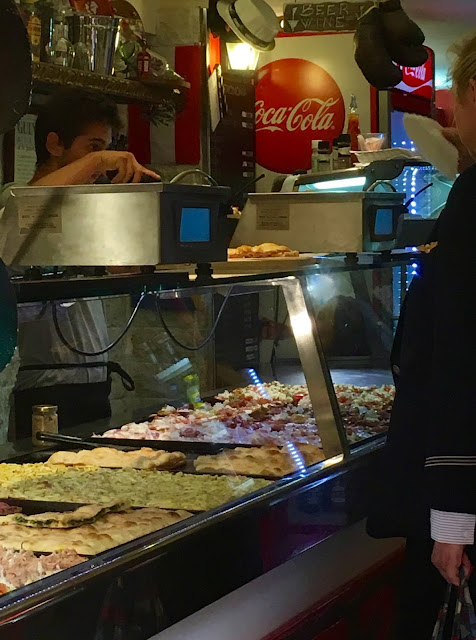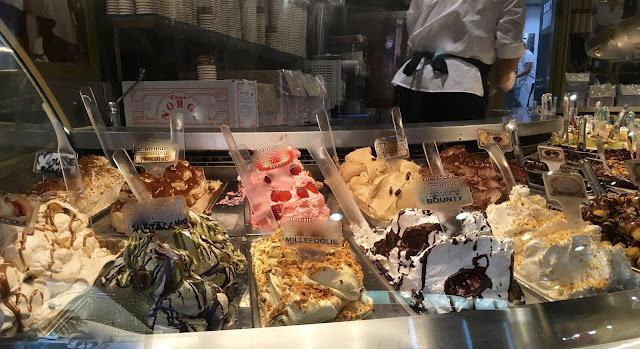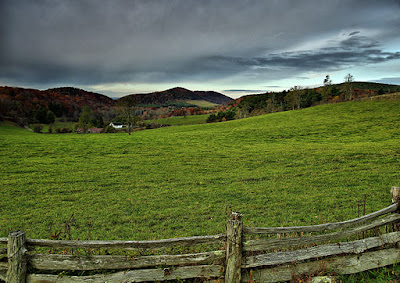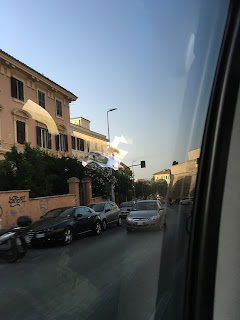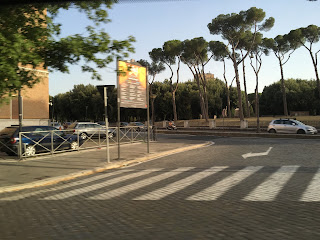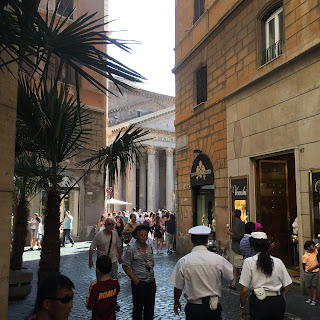...that is, if you don't like food.
I recently told an old high school chum - as his Facebook status proclaimed his upcoming trip to Hong Kong as a 'Dumpling Quest' - to 'please post food porn, and frequently.'
(And here are some questions about foodie-ness, given the sheer number of cooking shows and publications devoted to cooking and food that only seem to CONTINUE to grow in prevalence: how do you know when you've crossed over from just being fashionably food oriented to truly serious? Is there a specific benchmark of some kind - a particular appliance, the extenuating circumstances you will endure for procuring or preparing food, the acquisition of some rare spice? What does it take, and how hungry do you have to be?)
How I came to be such a fan of food, cookery and baking is a story for another time. But if I recall my first food experience in Rome - at the tender age of 20 - I can tell you that in another era of my life, I most assuredly did not have discerning taste. While I knew that my first taste of Roman pizza (from one of the many spots you can find around the city, with large, rectangular pizzas of medium thickness, sitting on display, sliced and at the ready for the hungry, budget-minded tourist) was remarkably disappointing, I could not say why, exactly.
Although technically, I would be corrected by a Napolitano who brought us here this evening: you're looking at Naples-style pizza, which is evident from the amount of crust around the outer perimeter. Roman pizza is similar in thickness and style, except that a lot less real estate is devoted to the naked crust. Instead, the ingredients tend to reach further out towards the edge.
While I know that this distinction is important to many, what should be stressed here is that either version is unbelievably good. Done right - hand-tossed to order and baked for 10 minutes or less in a wood-fired oven - this is nirvana.
Super-thin crust, crisp edges that are blackened in spots, with good quality sauces and fresh, minimally teamed ingredients in a vast array of combinations (but also set forth in complementary combinations, strictly speaking, so no gargantuan, artery-clogging 'meat-lovers' varieties here)...Although admittedly, my favorite is the closest thing you're going to get to a 'pepperoni pizza,' here. Peperoni in Italian (spelling change - dropping one 'p') is the word for a pepper - a vegetable. Pizza diavola ("devil") is tomato sauce, mozzarella (buffala would be best, but sometimes that's not in the cards) and spicy, or piccante, salami. If eating like this is eating with the devil, then I don't want to be good.
And it's all yours. You are expected to order this as a personal pizza. It's more like the size of an American medium pizza, but its de-emphasis on crust (in thickness, only, so don't assume that the dough isn't an artform, because it IS) makes it a potential one-person job. Albeit a very hungry person.
So, spend a few days hiking all 7 hills of Rome and then sit down to this. No worries. You'll have room for gelato afterwards, because you have to walk somewhere to find it anyway.
And this is another topic that deserves some attention and clarification.
Gelato.
It's what ice cream aspires to be, when it is dreaming alone in the freezer. Gelato is ice cream's rich, rotund (but having, allegedly, less butter fat than ice cream - and less butter fat actually enhances your ability to taste the flavors) cousin who issues no apologies for being so damnably attractive and simultaneously bad for your health.
And as you roam these rough, cobblestone streets, that sweet siren calls to you.
I remember a high school student on an Italy trip I chaperoned, years ago, whispering to me, almost tremulously, "I can't eat dinner. I don't want it. I had 5 different gelato servings today. They were so good - I couldn't help myself."
Her roommates later reported that she went to bed early, with a tummy-ache.
And not to be outdone is gelato's non-dairy neighbor, sorbet. Done well, it is creamy enough in texture to make you stop between spoonfuls - however briefly - and wonder aloud whether they didn't sneak some cow in there somewhere. And then you quickly rationalize that it's too late; dairy or no dairy, you're committed. Granitas are icier, often fruit flavored and less sugary, treats that really hit the spot on a sweltering day.
This is what the typical tourist in Italy sees and identifies as gelato:
But while that may qualify, in the loosest way possible, if you want the Good Stuff, you go looking for this:
You know you've struck gold when the blackberry sorbet is, in fact, black-purple, like the deepest bruise, and full of seeds, because some things deserve full investment.
The spouse and I go on our passeggiati, to better digest dinner, to enjoy that three hour window of cool temperatures (which are thwarted some time around 10 or 10:30pm, when Rome's stones on buildings and streets start to radiate the heat they absorbed during the day) and we both initially avow that we will not have gelato that evening. We're fine. We can do without. There's always tomorrow. And then we see just enough people in our path, meditatively working on a cone or otherwise immersed in cups with plastic spoons, and that's it. We cave in. We go to St. Crispin's, Teatro or Punto. We've been told by many that there are others to discover.
I'm not sure we can walk that far without stopping first at a known favorite, though.
And this just in: I've finally found these. I'd read about them, but never seen them.
I've been looking for years.
I recently told an old high school chum - as his Facebook status proclaimed his upcoming trip to Hong Kong as a 'Dumpling Quest' - to 'please post food porn, and frequently.'
(And here are some questions about foodie-ness, given the sheer number of cooking shows and publications devoted to cooking and food that only seem to CONTINUE to grow in prevalence: how do you know when you've crossed over from just being fashionably food oriented to truly serious? Is there a specific benchmark of some kind - a particular appliance, the extenuating circumstances you will endure for procuring or preparing food, the acquisition of some rare spice? What does it take, and how hungry do you have to be?)
How I came to be such a fan of food, cookery and baking is a story for another time. But if I recall my first food experience in Rome - at the tender age of 20 - I can tell you that in another era of my life, I most assuredly did not have discerning taste. While I knew that my first taste of Roman pizza (from one of the many spots you can find around the city, with large, rectangular pizzas of medium thickness, sitting on display, sliced and at the ready for the hungry, budget-minded tourist) was remarkably disappointing, I could not say why, exactly.
And years later, with a sizable number of college student trips (and pounds, oy!) under my belt, I can say exactly why. Pizza here, which should never be confused with pizza in its many forms and traditions in the States (I write this as an ode to the pizza I can get here, with full acknowledgment of the great types of pizzas found at home. Once I take a full-size food processor off the hands of a state department employee who's selling off her 220 volt appliances before leaving the country soon - I'll be scheming ways to make Chicago-style deep-dish pizza. But I'm excited to try the indigenous forms, too), ought to be like this:
 |
| From a hotspot for all the fashionably young and hip, Porto Fluviale. They let me in once I agreed to put a paper bag over my head. |
 |
| I am excited to report to all beer-ophiles that beer is not that difficult to find here. Craft beer is also making an appearance, but that's another blog post. |
Although technically, I would be corrected by a Napolitano who brought us here this evening: you're looking at Naples-style pizza, which is evident from the amount of crust around the outer perimeter. Roman pizza is similar in thickness and style, except that a lot less real estate is devoted to the naked crust. Instead, the ingredients tend to reach further out towards the edge.
While I know that this distinction is important to many, what should be stressed here is that either version is unbelievably good. Done right - hand-tossed to order and baked for 10 minutes or less in a wood-fired oven - this is nirvana.
Super-thin crust, crisp edges that are blackened in spots, with good quality sauces and fresh, minimally teamed ingredients in a vast array of combinations (but also set forth in complementary combinations, strictly speaking, so no gargantuan, artery-clogging 'meat-lovers' varieties here)...Although admittedly, my favorite is the closest thing you're going to get to a 'pepperoni pizza,' here. Peperoni in Italian (spelling change - dropping one 'p') is the word for a pepper - a vegetable. Pizza diavola ("devil") is tomato sauce, mozzarella (buffala would be best, but sometimes that's not in the cards) and spicy, or piccante, salami. If eating like this is eating with the devil, then I don't want to be good.
And it's all yours. You are expected to order this as a personal pizza. It's more like the size of an American medium pizza, but its de-emphasis on crust (in thickness, only, so don't assume that the dough isn't an artform, because it IS) makes it a potential one-person job. Albeit a very hungry person.
So, spend a few days hiking all 7 hills of Rome and then sit down to this. No worries. You'll have room for gelato afterwards, because you have to walk somewhere to find it anyway.
And this is another topic that deserves some attention and clarification.
Gelato.
It's what ice cream aspires to be, when it is dreaming alone in the freezer. Gelato is ice cream's rich, rotund (but having, allegedly, less butter fat than ice cream - and less butter fat actually enhances your ability to taste the flavors) cousin who issues no apologies for being so damnably attractive and simultaneously bad for your health.
And as you roam these rough, cobblestone streets, that sweet siren calls to you.
I remember a high school student on an Italy trip I chaperoned, years ago, whispering to me, almost tremulously, "I can't eat dinner. I don't want it. I had 5 different gelato servings today. They were so good - I couldn't help myself."
Her roommates later reported that she went to bed early, with a tummy-ache.
And not to be outdone is gelato's non-dairy neighbor, sorbet. Done well, it is creamy enough in texture to make you stop between spoonfuls - however briefly - and wonder aloud whether they didn't sneak some cow in there somewhere. And then you quickly rationalize that it's too late; dairy or no dairy, you're committed. Granitas are icier, often fruit flavored and less sugary, treats that really hit the spot on a sweltering day.
This is what the typical tourist in Italy sees and identifies as gelato:
But while that may qualify, in the loosest way possible, if you want the Good Stuff, you go looking for this:
 |
| Teatro Gelato - blessedly close to the apartment...but still requiring a walk, which gives you time to reflect upon the sins you will commit when ordering...and consuming. |
Note the differences between images: the more colored stuff piled high, almost piped into the bins, aerated and plumped with artificial ingredients...versus the far less colorful stuff that sits at a far more demure level, with just a little humble, tell-tale decor for identification purposes. Note the sampling of taste combinations here: peach with lavender, lemon with rosemary, raspberry with sage.
Hel-lo, lover! Celebrations of all things summer.
The truly artisanal producers of this desert change their menus like any restaurant changes up their daily specials, necessitating (ahem) your routine visits.
You know you've struck gold when the blackberry sorbet is, in fact, black-purple, like the deepest bruise, and full of seeds, because some things deserve full investment.
 |
| While I do admit to saying, once I've reached the bottom of the cup, 'more blackberry...want. more. blackberry,' it should be explained here that 'more' (MOR-ay) is the word for blackberries. |
The Saigon Cinnamon is a tad bit gritty - but because there's real cinnamon in the mix. The delicate Five Spice is a challenge, because you will encounter whole cloves here and there. You know that a gelato maker is serious when delicate rose wines are enlisted for a special flavor. Ricotta cheese flavor? Someone's making it. And even if you go for the very basic but still delicious Crema flavor, you can still taste the pride that went into making it.
The spouse and I go on our passeggiati, to better digest dinner, to enjoy that three hour window of cool temperatures (which are thwarted some time around 10 or 10:30pm, when Rome's stones on buildings and streets start to radiate the heat they absorbed during the day) and we both initially avow that we will not have gelato that evening. We're fine. We can do without. There's always tomorrow. And then we see just enough people in our path, meditatively working on a cone or otherwise immersed in cups with plastic spoons, and that's it. We cave in. We go to St. Crispin's, Teatro or Punto. We've been told by many that there are others to discover.
I'm not sure we can walk that far without stopping first at a known favorite, though.
And this just in: I've finally found these. I'd read about them, but never seen them.
I've been looking for years.
 |
| Lolli-popes! |
